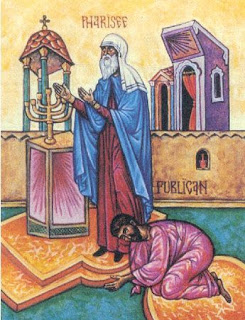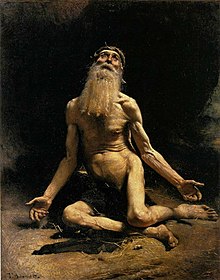'Jesus entered Jericho and was passing through it. A man was there named Zacchaeus; he was a chief tax collector and was rich. He was trying to see who Jesus was, but on account of the crowd he could not, because he was short in stature. So he ran ahead and climbed a sycamore tree to see him, because he was going to pass that way. When Jesus came to the place, he looked up and said to him, "Zacchaeus, hurry and come down; for I must stay at your house today." So he hurried down and was happy to welcome him. All who saw it began to grumble and said, "He has gone to be the guest of one who is a sinner." Zacchaeus stood there and said to the Lord, "Look, half of my possessions, Lord, I will give to the poor; and if I have defrauded anyone of anything, I will pay back four times as much." Then Jesus said to him, "Today salvation has come to this house, because he too is a son of Abraham. For the Son of Man came to seek out and to save the lost."'
--Luke 19: 1-10
How many of you remember the nursery rhyme about Zacchaeus, the wee little man? It went something like this:
I actually sang that in the pulpit on Sunday when I preached on this story. I had, in fact, never heard this song before I was serving as a youth minister and school chaplain just before seminary. It makes for a catchy song for kids to remember, but as Paul says in I Corinthians 13, now that we are adults we must reason and think like adults, and when we do that we find a whole lot going on here, which is a story about a miracle, really - making amends, repentance, conversion, and the power of the Gospel of Jesus Christ to change people’s lives if they are open to being changed.
Jesus says that he has come to seek out and save the lost, and to be certain Zacchaeus appears to rank among these. He is a chief tax collector, which means that he profited off of the corrupt system by which tax collectors would often charge ridiculous interest rates and cheat people, namely the poor. The chief tax collectors were then charged with making sure the Roman officials got their cut, so that the collaborative system of oppression could continue. Zacchaeus is among the most hated out of a group that is already pretty well hated.
This story, at first, looks like it will repeat what happened when Jesus encountered a rich young ruler just one chapter earlier. Remember that story, how the rich man was devastated when Jesus told him the only thing he lacked in order to inherit the Kingdom of Heaven was to sell all he had and give it to the poor?. Now we find another rich man, and this one a tax collector, which means Zacchaeus didn’t exactly earn his wealth by honest means. Surely, Jesus will call him out for his greed, right?
Here's why I love this story – and by extension the whole Gospel of Jesus – he never does what we expect him to do. Instead of calling out Zacchaeus’ sin, Jesus spots him in the tree and invites himself over for dinner. That seems a bit presumptuous, right? I mean, even for Jesus, to just say, “Hey! I’m coming over to your place for dinner, set another plate out!” seems a tad rude. Didn't his Blessed Mother raise him better? But let’s contextualize it for a second and remember what the table means. To invite someone to your table back then, and sometimes even now, was a power play; you invited others to dinner so that you may gain favor with them, which is why only those of equal or higher social standing were invited. Jesus turns this system around by inviting himself over. Once again, unexpected. That is pretty cool, and a helpful reminder for us even now to pay attention to whom we invite to our tables – and by extension, whom we do not invite. After all, Jesus made quite a habit of eating with the “wrong” kinds of people. Maybe we should follow his lead.
And this is where we see the conversion of Zacchaeus. Wherever he was spiritually before he saw Jesus, he’s not there anymore. He was certainly one of those who were lost, but now – through no will or actions of his own, but only by the grace of Jesus – he has been found. Which is why he doesn’t respond like the rich, young ruler. When the people start to grumble, he doesn’t try to defend himself. Instead, he wants to make restitution and reparation for what he has done. He will not only give half of his possessions to the poor, but from the rest he will pay back four times what he owes to any person whom he has defrauded. If we look at the Greek here, we have a curiosity: in the original Greek it’s not future tense – I will pay – it’s present tense – I am paying; and, in fact, the King James Version also uses the present tense. It’s not just some promise for the future that he may or may not fulfill, it’s happening right that second, and as is the case with the present tense of ancient Greek, it is implied that the paying is not just happening in that moment but will continue to happen, on and on into infinity. It is both a present reality and a future promise. Kind of like the Kingdom of Heaven itself.
This transformation is, quite simply, a miracle, and something of a fulfilled prophecy. Going back to the story of the rich, young ruler, Jesus points out that it would take a miracle for a rich person to enter the Kingdom of Heaven. One chapter later, behold the miracle. Zacchaeus, the rich tax collector hears Jesus’ invitation and willfully and freely chooses to seek forgiveness for the wrongs he has done, and in so doing is changed forever and gives each of us hope that regardless of how others may see us, whatever stuckness we find ourselves in as a result of our sin, we can get out of it by accepting the free gift of the grace of God and doing the hard work of making amends with those we’ve harmed. That is a miracle, and it still happens whenever God’s kindness inspires us to acts of justice.
We see in Zacchaeus another miracle, that of downward mobility. The world wasn’t that much different back in Jesus’ day as it is now. Folks were just as eager to move up in their social standing in 1st century Palestine as they are in 21st century America. Zacchaeus is a “climber” in more ways than one. He doesn’t just climb up that tree, but his role as a tax collector allowed him to move up and above his neighbors, resulting in them holding Zacchaeus and his ilk in contempt, judging them as sinners. But Jesus dismantles both of these claims to superiority when he calls Zacchaeus to “come down.” Zacchaeus can’t be in relationship to Jesus or his neighbors if he takes this lofty perch above everyone – both literally and metaphorically. He has to move down, move toward Jesus, move toward his neighbors. He had to abandon the vertical strategy for success that involved climbing over others, and instead adopt a horizontal vision of righteousness and justice characterized by redistributing his wealth. Downward mobility. Yet another miracle.
Finally, we have to imagine that Zacchaeus used this encounter with Jesus and this moment of inner transformation to help right the unjust system in which he had long participated. As New Testament scholar Fred Craddock put it “while nothing of Zacchaeus private life is revealed in this story, this much we know on principle: no one can privately be righteous while participating in and profiting from a program that robs and crushers other people.” No one leaves an encounter with Jesus and remains the same as they were before. The same must be have been true of Zacchaeus, of all of us. If we are not inspired by our own spiritual transformations to address the ills of our time, then what was the point of being transformed to begin with?
This is a story about how the grace of God can transform any of us, if we are open to receiving it. Zacchaeus does to fight back, he doesn’t defend his sinful actions when confronted by the crowd, but he is accountable for the wrongs he has done, makes amends, and is changed by the simple invitation from Jesus, “Come down.”. He at last has eyes to see where he has been and what he has done, and by “coming down,” moving toward Jesus and toward his neighbors, his whole being is transformed. When we are as open to receiving the grace of God as Zacchaeus is, our eyes are open and we see the foolishness in upward mobility and are inspired to make amends for our wrongs and undo the systems of oppression in which we ourselves have participated. There’s way more to this story than just a fun little nursery rhyme. Would that we could all be as eager to see Jesus and be transformed by him as this wee little man.





